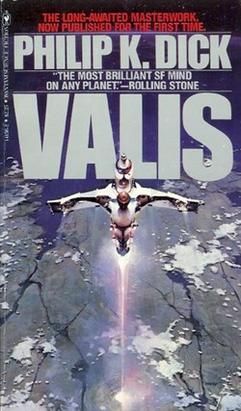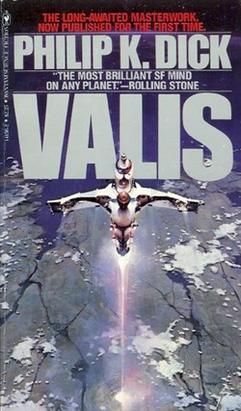Book Review: VALIS
by Vic Neptune
Philip K. Dick (1928-1982) was one of the most famous science fiction writers. He wrote Do Androids Dream of Electric Sheep?, basis of the legendary Ridley Scott film, Blade Runner (1982), and The Man in the High Castle (1962), basis of a multi-season Amazon TV series. Dick’s fame has increased enormously since his death from a heart attack, age fifty-three. He wrote forty-four novels, including some contemporary fiction, most of those not published during his lifetime.
Dick’s body of work comes to one basic question: What is reality?

In VALIS (1981), Dick draws on a profound personal experience from March 1974, when he was suffering after an operation on an impacted wisdom tooth. The woman from the pharmacy who delivered his medication wore a golden necklace, the Greek letter alpha. Sunlight reflected off of it into Dick’s eyes. Upon asking her what it was, she replied it was a sign worn by early Christians. Later, he began seeing flashes of light, a pink light predominantly. He also saw something like lightning flashing through his apartment in Santa Ana, California. His two cats died soon afterwards. Auditory hallucinations accompanied these strange events, too, such as peculiar voices coming from the radio.
The strangest thing of all was how he suddenly knew what was afflicting his young son, an inguinal hernia that had gotten worse over time, giving the boy chronic complaints. He told the family doctor about this and the condition was confirmed and operated on, to the child’s great benefit. Dick himself admitted in his notes and in his novel VALIS (based on all of these strange events) that he may have come across the medical information about the hernia in his extensive reading.
Dick read extensively to account for what had happened in March 1974. In the novel, Dick splits himself into two people, Horselover Fat, and the science fiction author Philip K. Dick. This automatically, in the first chapter, sets this novel apart from every other work of fiction, science fiction or otherwise. Dick early on admits he’s the troubled, crazy Horselover Fat; the one who tries to save his suicidal friend Gloria and later his friend Sherri, afflicted with cancer. That he can save neither drives him to attempt suicide. These attempts and times spent in psychiatric wards lead to his baffling religious experience that prompts him to begin writing an Exegesis (a critical interpretation of a text, especially of scripture). Dick’s own Exegesis has been edited and published--it’s not an easy read. Excerpts from Fat’s Exegesis appear in the novel’s narrative and are collected at the end. For instance:
“In seeing Christ in a vision I correctly said to him, ‘We need medical attention.’ In the vision there was an insane creator who destroyed what he created, without purpose; which is to say, irrationally...”
This reference to “an insane creator” harks back to Gnostic ideas of the time of early Christianity. Gnostics posited the idea that this world is not the real one, that it was created by a blind god, Samael--identified with Yahweh of the Old Testament—who doesn’t realize he rules over a false world. The Wachowskis in their film The Matrix (1999) drew on this Gnostic idea of a false world overlaying the real one.
In VALIS, Horselover Fat and his friends, David (a devout Roman Catholic) and Kevin (a cynical skeptic), debate about Fat’s spiritual experiences. One theory suggested is that Soviet experimentation with long range microwave transmissions inadvertently crossed paths with Fat’s (Dick’s) apartment, stimulating a segment of his brain resulting in increased phosphene activity—in other words, his neurons fired excessively, as happens in a schizophrenic or bipolar person’s psychotic episode. Previously unfamiliar areas of the brain open up in such instances resulting in a new perspective on reality, incommunicable to others in the “real” world, or false world created by the blind Samael, to use Gnostic terms.
William S. Burroughs wrote: “A paranoid is someone who knows a little of what’s going on. A psychotic is a guy who’s just found out what’s going on.”
This stems, I know (from being bipolar myself), from a massive increase in neuronal firing going on in a brain opened up in a psychotic episode, resulting in an avalanche of information coming into awareness; seeing more of reality, so to speak, than one can handle in one go. Prophets in the Old Testament would likely find themselves in our modern society locked up in mental wards.
Horselover Fat’s “pink beam experience” thus overwhelms his rational everyday mind, as it would anyone’s. When Kevin (based on Dick’s friend, the science fiction novelist K.W. Jeter) and David (based on the science fiction novelist Tim Powers) go with Fat to see a strange science fiction film, VALIS (meaning Vast Active Living Intelligence System), written and directed by and starring a popular singer, Eric Lampton, they see all of Horselover Fat’s (and Phil Dick’s) religious experiences on display. Lampton seems to be aware of everything connected to the “pink beam experience.” In the movie, the beam originates from an alien satellite that’s been in the vicinity of Earth for thousands of years. There are three-eyed beings from the future who are actually descendents of modern humankind. Phil Dick, the one in the novel, tells his friends he knows the man who did the still photography for the film. They want to meet Eric Lampton and his co-star wife, Linda, and the film’s soundtrack composer, Brent Mini, whose electronic sounds create subliminal information firings in the cerebral cortex, causing them to remember aspects of the film not noticed when they first saw it.
Through Phil’s photographer acquaintance they travel to Sonoma in northern California to meet the Lamptons. Eric and Linda Lampton live in a big country house; Brent Mini, crippled by radiation from his electromagnetic experiments involving sound is also in the know about VALIS, that it’s of unearthly origin. The Lamptons claim to be aliens from a planet called Albemuth. Phil/ Fat and David and Kevin think they’re the most whacked out people they’ve ever met. They claim too that Linda’s two year old daughter, conceived by VALIS, is the Savior they’ve all been waiting for. When they meet her she’s sitting among her sheep and goats, seeming like a little girl until she speaks in a neutral voice, the first thing coming out of her mouth, “You committed a sin against your life and body when you tried to kill yourself!” This admonition, directed at Phil specifically, causes him to look at Horselover Fat, who is no longer there. Philip K. Dick has returned to himself. Fat was a projection no longer needed.
The little girl, Sophia (meaning wisdom in Greek) often just says, “I am that which I am,” a variation on the name of Yahweh, “I am that I am.” The three friends feel awed by her but at the same time wary of the Lamptons. A voice (Sophia’s?) enters Phil’s head saying they should leave and refuse the offered dinner invitation. Phil simultaneously sees the yard and the interior of the airplane flying them back to Los Angeles, just as he/Fat saw ancient Rome superimposed on modern Santa Ana when the pharmacy delivery woman gave him the medication.
Later, Eric Lampton calls Phil to tell him that Brent Mini accidentally killed Sophia with an electronics experiment, zapping her brain apparently with too much juice. Phil finds himself talking again with his alter ego, Horselover Fat, who tells him he still wants to find the Savior and will search in Asia. Phil one Saturday morning sees a TV ad ending with the word “King,” followed by a Felix the Cat cartoon. KING FELIX (meaning “happy king or ruler”) is the cyphre by which the Lamptons and Phil/Fat were able to hook up when Eric Lampton sends Phil a sheet with the word KING and what comes next?
Phil, evidently missing the Horselover Fat part of himself, sits down in front of the TV and waits, as it was decreed long ago that those waiting for the return of the Messiah should do.
That VALIS is a peculiar and difficult novel is an understatement. Between the dialogue sections, the often very funny back and forth exchanges of Phil, Fat, David, and Kevin, are large sections of philosophical and religious ideas. I majored in religious studies from the age of twenty-three to twenty-six, but I first read this novel at age nineteen. What struck me the first time was the novelty of the author putting himself into the book under his own name, but also fictionalizing himself under a different name.
As Philip K. Dick novels go, it’s not one I’d recommend to a first time reader of his extensive work. His science fiction novels of the 1960s, particularly Martian Time-Slip (1964), Now Wait For Last Year (1966), or Ubik (1969) stand out as excellent places to start, but really, I had no plan when I started reading his work. VALIS was the third novel of his that I read, only a year after he died. For a few years after his death it was relatively easy and inexpensive to find and buy all of his published books. Once the strength of his legend increased over later years, finding a used Philip K. Dick paperback in a bookstore became a rare treat, but by then I had everything. I believe that now all of his novels are in print, or at least not difficult to locate.
He was a modern philosophical thinker of great significance who just happened to put his ideas into science fiction, a genre that, by his own admission, was a kind of garbage literature, but one that he loved from boyhood, nevertheless. Just as a flash of sunlight off of a pharmacy delivery woman’s alpha fish Christian necklace can inspire a million words and visions, so can the pulp science fiction magazines Philip K. Dick loved as a boy and young man lead to a career resulting in some of the most stimulating speculative literature of all time.
Vic Neptune writes, makes movies (YouTube Channel John Berner), collages, paintings. Movies made as Rhombus. Film criticism based on thousands of movies of all eras seen. Strong interest in literature: Shakespeare, Thomas Mann, Jack London, Robert E. Howard, Joan Didion, Philip K. Dick, and many others. History and religion other interests also. Favorite filmmakers: Jean-Luc Godard, Michelangelo Antonioni, Pier Paolo Pasolini, Rainer Werner Fassbinder, and Federico Fellini. Life without art is art without life.



